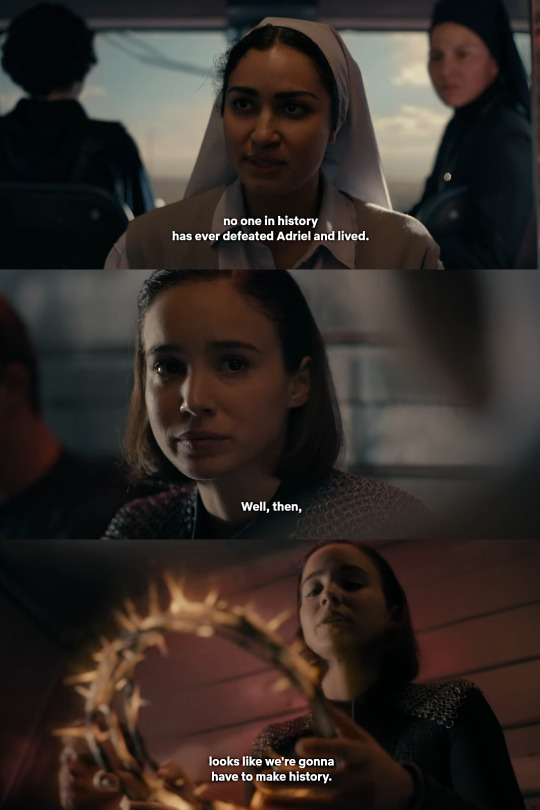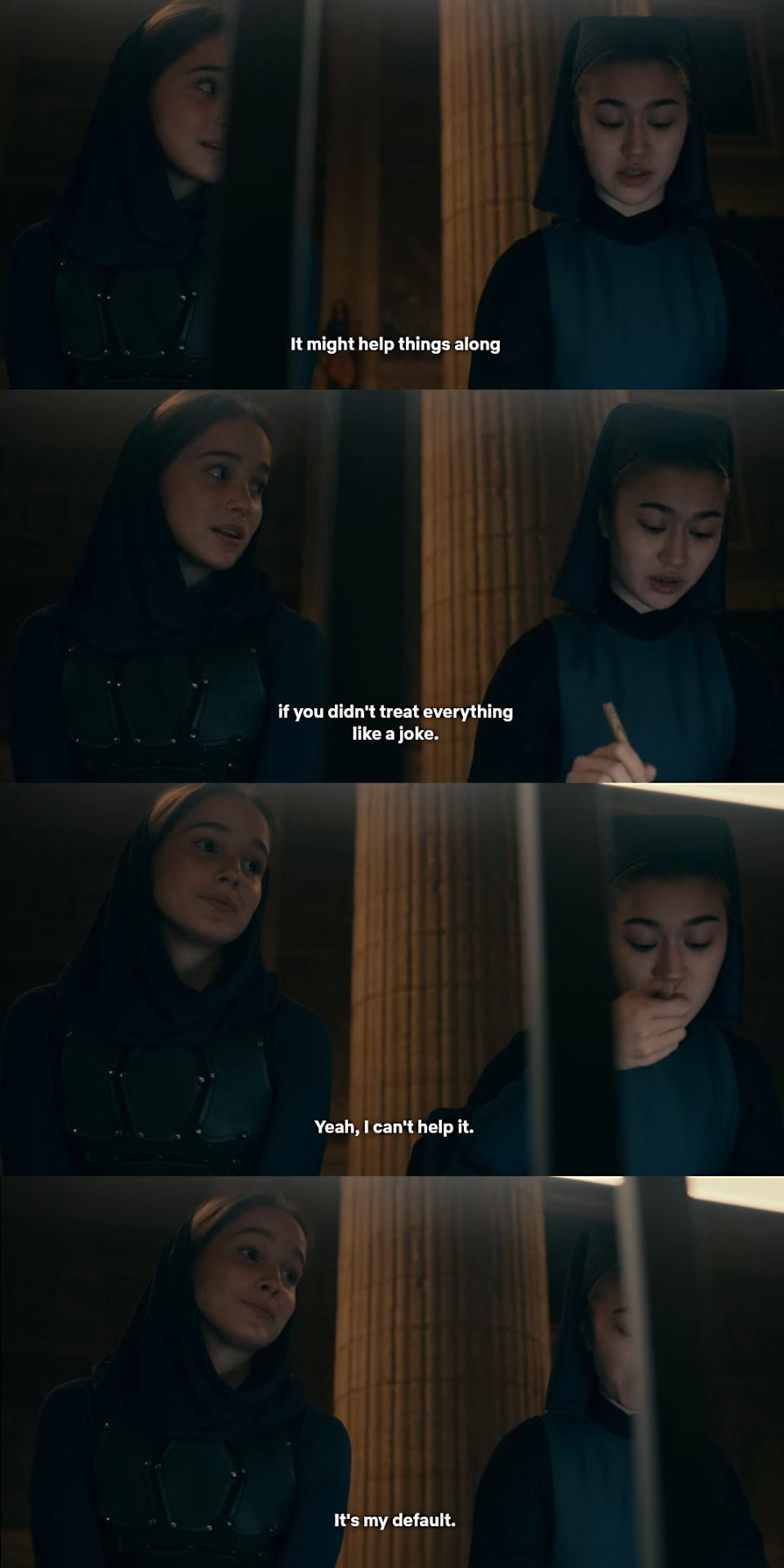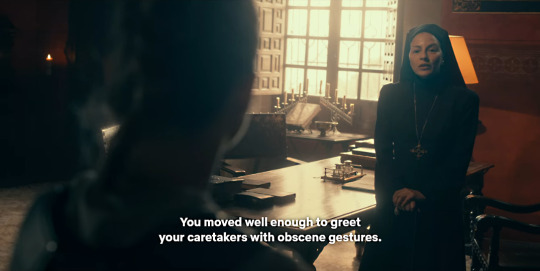#(but that might just be the luciferian in me speaking lol)
Text
Finding "the meaning" to a show that could have had up to five or seven seasons but was cancelled after the second is somewhat like trying to understand a novel composed of seventy chapters by having read only twenty — there is a whole wealth of information which we do not possess that could alter our reading of any given element or of the entire thing in itself.
Still, there are always patterns that weave a story into a cohesive unit and they can help us to better grope in darkness towards comprehension. One such pattern in Warrior Nun appears to be how the consequences to mistakes, "sins" or evil deeds committed by characters manifest.

Basic storytelling usually requires characters to act on something so that complications or resolutions may arise from their choices and move the plot forwards. In Warrior Nun, many of these actions are quite tragic in nature: Suzanne's arrogance and pride lead to the death of her Mother Superion; Vincent's allegiance to the higher power he believed Adriel to be inspired him to kill Shannon; Ava's flight from the Cat's Cradle ends up damning Lilith as she is mortally wounded and taken away by a tarask... All of these events have negative outcomes and heavy repercussions on all characters directly or indirectly involved. Something changes permanently because of them, be it in the world around them or within the characters themselves.
And yet, it would seem that all of these dark deeds not only move the story forwards but might also have overall positive results. We would have had no protagonist without Ava — and she would arguably never have received the halo to begin with had she not been murdered. What's more, on a personal scale, the horrifying crime she suffers is, in the end, the very thing that allows her a second chance in life, a new life.
An act of outside evil permits Ava to grow and develop, shows her a path she would not otherwise have found. Without her own season in some sort of hell, Lilith would not have been able to advance towards other ways of being and understanding beyond her very strict limitations. Vincent and Suzanne would not have embarked on their own journeys of enlightenment without having caused the pain they are responsible for.

Beatrice might have been paying for someone else's mistakes, but she, too, is given the chance to grow into herself through it. The afflictions that torment these characters advance the overall plot, but they also advance them, as individuals, as long as they are willing to learn and keep going despite the calamities large and small that they are faced with. Beatrice keeps going after parental rejection, Mary keeps going after losing Shannon, Jillian keeps going after losing her son (in part through her own actions, adding insult to injury)... Trouble and the adaptation that follows it, if one is open enough to learn from the experience, motivates the characters, propels them forward, teaches them.
The problem of evil has occupied the minds of many a thinker throughout the ages, given how the very existence of it, evil, might call into question that of God (a good, omniscient, omnipotent one, anyway). A common way of justifying suffering (and also God), then, is by claiming, as Saint Augustine, that "God judged it better to bring good out of evil than not to permit any evil to exist".
Now, it would be rather ridiculous to say of Warrior Nun that it follows in Leibniz's footsteps, also because this philosopher, expanding on the augustinian concept, attempted to defend the goodness of a real God with his "best of all possible worlds" while all we have is... Well, whatever/whoever Reya is.

But there seems to be an inclination towards some sort of optimism as a worldview nonetheless.
Betrayals reveal truth and grant knowledge (Vincent's culminates with the coming of Adriel, which allows us to know of the threat of a "Holy War" and thus prepare for it; Kristian's gives Jillian much needed insight, William's lights up the fuse for the fight to be taken more seriously...), crimes committed willingly or not open the way for Ava (Suzanne's killing of her Mother Superion causes the loss of the halo, which is transferred to Shannon, whose death opens the gates for Ava to walk through after being herself murdered by sister Frances)... The magnitude of these positive outcomes is perhaps not "balanced" when compared to the evil that brings them about, but there is still something to take out of the catastrophe.
However tragic the tones of a given event, the show itself appears to shun the predetermination that makes tragedy as a genre; if everything is connected, here it at least appears to not necessarily drag everyone into their horrible dooms.
What's more is that this lurking "optimism" matches really well with our own protagonist's personality.

And it makes perfect sense that Ava would do the best she could with whatever she is given.
Life for her, in the conditions she experienced after the accident, would have been unbearable without some sort of positive outlook on life. However deadpan, the joking and the "obscene gestures" and whatever other forms of goofing around beside Diego are a way of turning a portion of the situation in her own favour. Proverbial eggs have, after all, already been broken right and left — might as well make an omelette of whatever remains.


Humour is just another way of looking at the bright side of something, or, at the every least, of mitigating the utter horror it might bring. If the show allows for moments of lightness, if it lets us laugh, if it takes us through a perilous voyage which still bears ripe, succulent fruit instead of the rot of pessimism and its necessary contempt for humanity, it is because Ava herself sees things in this way. It isn't gratuitous or naïve in this case, but a true survival strategy, especially as it is confronted with the morbidity of Catholicism.
Here is a religion that soothes its faithful with the promise of reward in the afterlife — how else does one charge into battle against the unknown, risking one's own death along with that of one's sisters, without the balm of believing that we shall all meet again eventually, "in this life or the next"? How else does one come to terms with the ugliness and the pain of this existence if not by looking forward to a paradise perfect enough to make all trials and tribulations here worth it?
True nihilism would have annihilated Ava. Her present perspective is what avoided the abyss.
And there is nothing Panglossian to her attitude or what the show might imply by giving us her view on things. This isn't about "the best of all possible worlds", but of making the best of whatever situation we're in, of taking what we have and doing something with it, something good, something of ourselves. It isn't God making good out of evil, but our choices.

Killing innocent people and feeling no remorse will never be the best someone can aspire to do. Sister Frances, cardinal William, Adriel all learn this the hard way.
Those who do their best find that, somehow, they can move on from whatever it was that paralysed them. Ava, most of all, knows what it is to be stuck, frozen in place; she can never be the character who refuses to grow, even through pain, lest she condemns her spirit to the same fate her body is all too familiarised with. Those around her wise enough to let themselves be touched by her, by the dynamic power she carries, walk forth with her and live.
It says very little about "God" that Warrior Nun should adopt its heroine's views and seem "optimistic" as it progresses — but it speaks volumes about the values it presents for pondering, of the inspiration its protagonists provide, and of the multiple reasons why this is a story unlike most others.

#warrior nun#ava silva#you know it's actually very funny to type this as someone who is very schopenhaurian with hints of nietzsche#but i AM doing the best i can too :)#again i will reiterate that i don't think this apparent optimism has anything to do with the classic theodicy#if anything i see it more as a cry in favour of antitheism -- this is YOUR life fuck god#life is shitty so carve out your own makeshift paradise out of the wreck you are given#and don't make things harder for anyone else in the process if you can avoid it#(but that might just be the luciferian in me speaking lol)#anywho this post is a translation of one i wrote not too long ago in cryptic english and a ton of tags#so if it seems familiar that's why#also i do find it rather telling that whenever i try to delve into how the show structures things i talk about ava#i don't set out to analyse her -- but in analysing the show i must analyse her as well if by the edges#which again points to how finely woven she is to the fabric of the entire thing#remember how i said ava is a representation of free will?#well this whole bringing good out of evil thing also touches upon it#saint augustine maintains that it is precisely free will that allows us to do it -- to choose good#of course he means it in a sense of being free to pursue god rather than evil but you see the parallel still works#(this is the post i mentioned in the last reblog. figured i'd go ahead and throw it in the wild since there are more brewing)#analysis and similar#exercises in observation
121 notes
·
View notes
Note
This might be a bit of a long, rambly ask, so I apologize in advance but I find everything you talk about so fascinating. I'll try to break this down into parts:
Where did you learn all this? The great war, demons and pagan gods being pushed out and treated as evil, etc. Is there a book(s) on the topic or did you have to converse with spirits/Gods for this knowledge?
When it comes to the Great Usurper, what exactly is known about him? I remember you saying Lucifer came first, right? What's Jehovah's story, if you don't mind my asking (dunno if it's offensive to ask since he's the bad guy, right?)
Finally, I really am considering becoming Luciferian/Pagan after being a pretty hardline atheist for a while, but I'll admit, I'm scared to make the switch. I grew up in a pretty toxic Christian household, so I still have some trepidation about becoming religious again, even moreso with anything close to abrahamic beliefs.
I'm scared believing in Jehovah, even as a villain figure, will "prove my parents right" as silly as that sounds
And I'm ashamed to say that, even with everything I've learned, how much of it is lies, the idea of Hell or eternal damnation still scares me :/ I guess religious abuse does that to a person lol but I don't wanna give up, even as a "Christian" I was drawn to Lucifer and Satan and the Devil. Demons in general really, they were always so fascinating. So do you or the Gods have any tips on how to overcome all of that?
Sorry for the long ask, thank you for your time.
Hello sweetheart, thank you for asking <3
For your first questions, I devoted many years of my life to developing the ability to speak with spirits so I could communicate with the deities. Through this, I have been able to receive many answers from them about what their history is and about how every religion is a piece of the entire truth of things. There aren’t any true books that speak on these things and are usually written as theories.
For Jehovah, he had been created as one of the Aeonic deities whose tasks are to create the physical and metaphysical Universes. In short, Jehovah was not satisfied with himself nor his role and so sought to take claim over one of the planets, which unfortunately was this one. Due to his immense power as an Aeon, he was able to defend himself from the gods of this Universe and portray himself as the supreme god to humans, who easily fell for this and his manipulative teachings.
I can understand how anxiety-inducing it can feel to switch beliefs, especially for someone who started off Christian. It may take some time, but try to slowly bring yourself into seeing the world differently and try to reach out to some deities who interest you. As for believing in Jehovah, since he isn’t how the Bible portrays him at all and is actually an imposter, you aren’t proving them right but are realizing that what they worship is a lie that has brutally damaged this world and caused massacres.
Unfortunately, most of the things we are taught are built upon lies, even some basic history “facts” are hiding the truth. Though the Abrahamic religions are one of the greatest lies of all, built from people who sought dominion over others and built their religions on the bones of polytheists and their own myths. I can also assure you that Hell isn’t something for most people to worry about, only the worst sort of people get sent here (for crimes such as mass murder, destroying pagan religions, etc). So as long as you are a decent person and remain true to your path in life, you have no chance of being sent there.
As for working with demons, the first step is to basically work on undoing all of the Christian brainwashing of them being evil; some few are dangerous or corrupt, but the majority I’ve met are good-natured (which pretty much goes for many other races of beings). I would suggest working with perhaps one or two to begin with, just so you can adjust and learn first-hand what they tend to be like. Overall, the demons seek to help people evolve through adversity and teach one to question everything so they can seek truth hidden within darkness.
Some of the best demons to work with as a beginner are Lucifer, Lilith, Naema, Asmodeus, Aetherea, Vassago, Vual, or Orobas. If you want someone who tends to be very friendly, I’d suggest Orobas; Lilith tends to be motherly and Lucifer is a very wise mentor. These demons aren’t listed due to how kind they are (though they are very kind), these just tend to be the ones who are usually more willing to help a person figure things out and are easily approachable.
58 notes
·
View notes